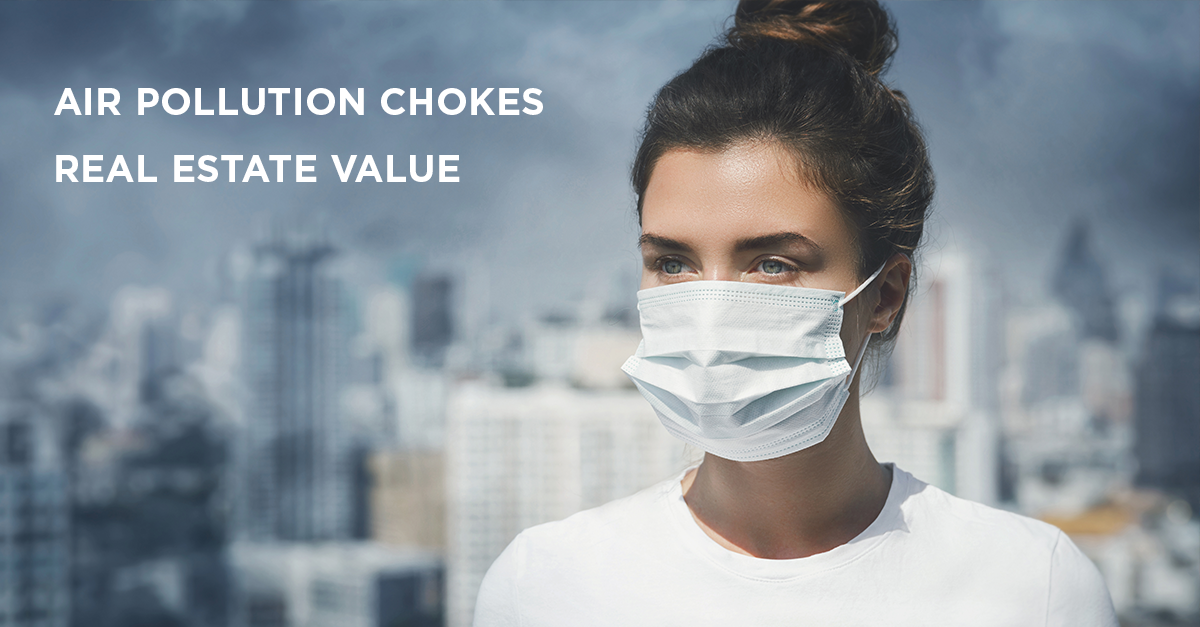Air pollution chokes real estate value
One of the foremost criteria considered, when determining the value of a construction site or the purchase of a property, is ‘location’. In the past, such factors were confined to the property’s distance from central hubs, main roads, parks and schools. With time, in a world dealing with breakneck urbanization and unrestrained industrialization, these considerations have come to include much more. Today, property buyers are taking into account the local pollution levels, sanitation standards and sustainability as well. There are demonstrable examples of the general devaluation of real estate in cities where pollution level has been left unchecked for too long.
Air pollution is the presence of excessive quantities of particulate matter, ozone, carbon emissions, nitrogen and sulphur oxides in the atmosphere, posing a major threat to health and climate. Except smog, air pollutants are seldom visible to the naked eye, which had undermined greater awareness around the issue, in the past. As air quality monitoring began to be empowered through the intervention of local governing bodies, environmental agencies and observer organizations, property buyers also started to take increasing notice of reported figures, in making their purchase decisions.
Global real estate
According to the World Economic Forum, the average European lifespan has been reduced by two years, due to air pollution across the continent (1). Air pollution currently accounts for 17% of annual mortality in Europe. Over the last five years, air pollution across the world has risen by an alarming 8%. The statistics are particularly frightening in countries such as India, Pakistan and China. Delhi, India’s capital territory, made international headlines recently after air pollution hit hazardous levels. However, it did not deter the local property market, as price points remained relatively flat. As a matter of fact, low property prices resulted in higher demand in Delhi, which is mostly owed to India’s massive population, which continues to support the market regardless of extraneous factors. Such market behaviour, however, is restricted to India and China, where the housing demand boils down to demographics.
From the global standpoint, air pollution is known to reduce real estate value by up to 15% (2). Although South Asia is among the most polluted regions in the world, the regional real estate market is largely independent of it. In contrast, despite the average air quality in the US and Canada being good in comparison, pollution levels are a much more active causal element in the regional real estate outlook. To be fair, China has attempted some radical rectification in this regard, with is bearing fruit, as average concentrations in major cities fell by 12% year-over-year in 2018. This led to Greenpeace ranking Beijing as the 122nd most polluted city in the world (3). Having fallen several notches, Beijing continues with what has been termed as a ‘war on pollution’, which saw the government halt several real estate projects and streamline other developments.
On the back of research findings that massive economic benefits can be unlocked by redressing air pollution, the US and several European countries are promoting alternatives to burning fossil fuels. Europe stands to add up to $775 billion in value by 2025, by reducing health costs and the economic fallout of premature deaths, as well as an upswing in tourism and real estate prices. In this regard, it is noteworthy that air pollution can result from non-industrial causes as well. For instance, wildfires have contributed vastly to air pollution in the US, in the past year. Likewise, windblown dust storms have a significant hand in the Middle East’s air pollution.
Air pollution in Dubai
The UAE, despite being at the forefront of industrialization in the region, has ambitious pollution reduction targets in place, taking cognizance of WHO guidelines. Dubai is among the 35 cities who recently pledged to improve air quality, by signing the C40 Clean Air Cities Declaration, which entails cities introducing new environmental policies by 2025 and publicly reporting their progress (4). A consensus was reached among representatives of urban centers from across the globe, on the need to steer clear of fossil fuel-based power generation and transportation. London, Washington D.C., Tokyo, Berlin and Delhi are among the major cities that signed the declaration.
Besides dust storms, transportation is being singled out as the leading cause of air pollution in the UAE. This is particularly the case in Dubai, which records the highest usage of private vehicles. Governing bodies in the UAE have ramped up the efforts since 2015, leading to the establishment of an air quality station at the Ministry of Climate Change and Environment and endorsement of Plume Air Report app for residents, among other initiatives. Unlike transportation and fossil fuel-based industries and refineries, the regional real estate sector has been quicker to adopt sustainable practices, curbing carbon emissions and moving away from a long-standing reliance on fossil fuel-based boiler systems.
Despite recording high PM2.5 levels, and exceeding the WHO guidelines, the air pollution in Dubai has not rendered a knock-on effect on regional real estate value. Timely governmental efforts to diversify the economy, from oil-centric to knowledge-based, electrification of transportation and greater efforts to de-carbonize power generation are some positives so far. Nevertheless, for Dubai to continue to grow as a lucrative investment destination for international real estate investments, the focus on air quality, as well as finding alternatives to polluting practices, will need to continue and expand further.
- https://www.weforum.org/agenda/2019/04/air-pollution-in-europe-is-reducing-the-average-lifespan-by-2-years
- https://breezometer.com/air-quality-map/real-estate-report
- https://www.airvisual.com/world-most-polluted-cities/world-air-quality-report-2018-en.pdf
- https://www.thenational.ae/uae/environment/dubai-signs-pledge-to-improve-city-s-air-quality-1.926092




